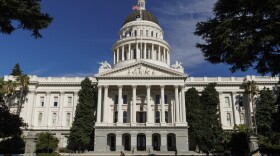Egyptian troops scuffled with holdout protesters in Tahrir Square on Sunday as they moved in to dismantle the protest camp after the fall of President Hosni Mubarak, but outbreaks of labor unrest, including a demonstration by police, reflected the challenges of steering Egypt toward stability and democratic rule.
The country's military council also dissolved Parliament and suspended the constitution on Sunday, meeting two key demands of protesters who have been keeping up pressure for immediate steps to push forward the transition to democratic, civilian rule.
The military said it will run the country until presidential and parliamentary elections can be held. The leaders said they were forming a committee to amend the constitution and set the rules for a popular referendum to endorse the amendments.
The caretaker Cabinet, which was appointed by Mubarak shortly after the mass pro-democracy protests began on Jan. 25, will remain in place until a new Cabinet in formed — a step that is not expected to happen until after elections.
A coalition of five protest groups called on the military to move quickly to create a broad-based transitional government and end the state of emergency that's been in place for nearly 30 years. The protesters said they would rally again next Friday to celebrate Mubarak's ouster, honor those killed in the revolt — and importantly — remind the military of the movement's strength.
"We trust the army, but not 100 percent," one of the protest organizers, Bassem Kamel, told NPR's Eric Westervelt. "If the army goes in our way, so it will be a ceremony and celebrate our victory. But if they will not do what we want, it will be a [message to] the people again to stay in Tahrir Square and start our work again."
Holdouts In The Square
On Sunday, troops pushed aside a dwindling band of protesters who don't want to abandon their Tahrir Square encampment, fearful that the generals entrusted with a transition to democratic rule will not fulfill their pledges.
Still, most protesters had left the square in downtown Cairo, and traffic moved through the area for the first time, even though some activists tried to block vehicles by laying down blankets in the road.
In Tahrir Square, soldiers and military police took down makeshift tents, scuffles broke out with some young men who refused to leave. Many local residents shouted at the protesters that it was time to go.
The crowd in the square was down from a peak of a quarter-million at the height of the demonstrations to a few thousand on Sunday. Most of those remaining were pushed to sidewalks and the streets were open to traffic for the first time in more than two weeks.
A coalition of youth and opposition groups that was the driving force of the movement pulled supporters from the streets, calling instead for weekly mass demonstrations every Friday to keep up pressure.
"It's time we show that we trust the army," said organizer Nasser Abdel-Hamid.
Ramy Mohammed, who has been camped on the square since the protests began on Jan. 25, said some troops beat the protesters with sticks as they tried to clear the square.
"We were chanting peacefully," he said. "They wanted to remove the tents but we still need guarantees. The army's latest statement was vague and didn't tell us exactly what they are going to do."
Other Protests Emerge
There were also protests at a ceramic factory, a textile factory and at least two banks as Egyptians sought to improve their lot in a country where poverty and other challenges will take years or decades to address.
Several hundred police marched into Tahrir Square to protest in front of the Interior Ministry, which oversees them.
"This is our ministry," the police shouted. They demanded better living conditions, but they also sought to absolve themselves of responsibility for an attempted crackdown by police in late January that killed many demonstrators. The anti-government crowds prevailed, and police vanished from the streets of Cairo for a time.
"All these orders were coming from senior leaders, this is not our fault," said Said Abdul-Rahim, a low-ranking officer.
"You have done this inhuman act," a bystander said. "We no longer trust you."
Hearing the accusations, Abdul-Rahim broke down in tears.
"I didn't do it," he implored. "I didn't do it."
The demonstrating police, whose force has been resented for corruption and brutality under a decades-old emergency law, appealed for solidarity with Egyptians whose protests forced Mubarak to resign on Friday.
"The people and the police are one hand," they chanted, using an expression for unity.
The interior minister, Mahmoud Wagdy, recently installed as part of a Mubarak Cabinet shuffle during the unrest, emerged from the building to talk to the police. He said they had a right to be angry.
"Give me a chance," he said.
The First Cohesive List Of Demands
With Mubarak gone, Egypt's future will likely be shaped by three powers: the military, the protesters and the sprawling infrastructure of Mubarak's regime that remains in place, dominating the bureaucracy, the police, state media and parts of the economy.
The coalition behind the protests issued its first cohesive list of demands for handling the transition to democracy. Their focus was on ensuring they — not just the military or members of Mubarak's regime — have a seat at the table in deliberations shaping the future.
Demands of protesters include lifting of the emergency law, which grants wide powers to the police and restricts the right to assemble; creation of a leadership council, made up of a military representative and two other figures of authority; dissolution of the Parliament, which is dominated by the ruling party; and the formation of a committee to either amend or rewrite completely the constitution.
The Armed Forces Supreme Council is now the official ruler after Mubarak handed it power. It consists of the commanders of each military branch, the chief of staff and Defense Minister Hussein Tantawi.
The military took power after pleas from protesters, and it has promised to ensure democratic change, making it highly popular with the movement.
But there are doubts about the military's commitment to true reform. It was tightly bound to Mubarak's ruling system, and it has substantial economic interests, running businesses that it will likely seek to preserve.
The council of generals has said little about how the transition will be carried out, though it pledged on to respect Egypt's regional and international agreements.
NPR's Eric Westervelt contributed to this report, which includes material from The Associated Press.
Copyright 2022 NPR. To see more, visit https://www.npr.org. 9(MDAzMjM2NDYzMDEyMzc1Njk5NjAxNzY3OQ001))






